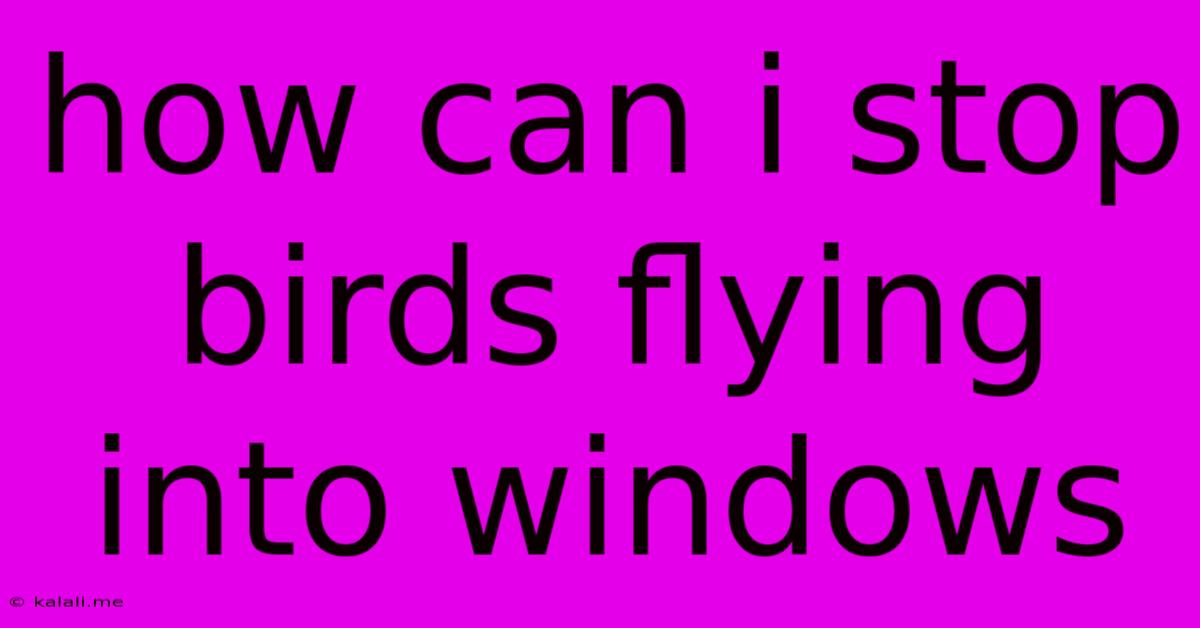How Can I Stop Birds Flying Into Windows
Kalali
May 25, 2025 · 3 min read

Table of Contents
How to Stop Birds From Flying Into Windows: A Comprehensive Guide
Birds flying into windows are a sadly common occurrence, often resulting in injury or death for the birds and distress for homeowners. This problem is easily solvable with a few simple, effective strategies. This guide explores various methods, from simple DIY solutions to more sophisticated deterrents, helping you create a bird-friendly environment while protecting your windows.
Understanding the Problem: Why Birds Hit Windows
Birds see reflections in windows as open sky or a continuation of their natural environment. They don't recognize the glass as a solid barrier, leading to collisions. Factors like the surrounding landscape, glass type (reflective or tinted), and even the presence of feeders can exacerbate the problem.
Effective Solutions to Prevent Bird Window Collisions
Here are several proven methods to deter birds from flying into your windows:
1. Visual Deterrents: Making Windows Visible to Birds
These solutions aim to make the windows more visible to birds, preventing collisions by altering the reflection or adding visual cues.
- Window decals: Applying decals or stickers, particularly those with bird-friendly patterns (e.g., silhouettes of raptors, geometric shapes), can disrupt the reflection and alert birds to the presence of glass. Consider using UV-reflective stickers, as birds can see ultraviolet light, making these particularly effective.
- External netting: Netting placed outside the windows creates a visual barrier without obstructing the view from inside.
- Window film: Special bird-friendly window films are available. These films create a patterned reflection that's less appealing to birds while still allowing for clear visibility from inside.
- Paint designs: Painting patterns or silhouettes on windows can be a less permanent, but still effective, solution. Simple geometric shapes are often successful.
2. Auditory Deterrents: Using Sound to Warn Birds
While visual cues are usually most effective, sound can also play a role.
- Motion-activated devices: These devices emit a sound or flash of light when movement is detected near the window, startling birds and preventing collisions.
3. Strategic Landscaping: Modifying the Environment
Altering the surrounding environment can minimize the likelihood of bird strikes.
- Planting shrubs and bushes: Planting vegetation near windows provides natural barriers and reduces the attractiveness of the window reflection.
- Moving feeders: Relocating bird feeders away from windows can reduce the frequency of birds approaching the glass.
4. Consider Professional Help
For extensive window areas or particularly persistent problems, consider contacting a professional wildlife control expert for more advanced solutions or a comprehensive assessment of your property.
Choosing the Right Solution:
The best approach depends on your specific situation, budget, and the severity of the bird-window collision problem. For a simple, cost-effective solution, window decals or stickers are a great starting point. If you have a large number of windows or a particularly reflective glass surface, a more substantial solution like window film or external netting might be more appropriate. Combining multiple methods often yields the best results.
Maintaining a Bird-Friendly Environment:
Remember that even with preventative measures in place, occasional collisions may still occur. Always check your windows for injured birds and provide appropriate assistance if necessary. A humane and proactive approach will ensure a safe environment for both birds and homeowners.
Latest Posts
Latest Posts
-
How To Cap A Sprinkler Head
May 25, 2025
-
Unexpected Method Appcast Called On Cask
May 25, 2025
-
Order Details Before Pay Ux Design
May 25, 2025
-
How To Get Super Glue Off Finger
May 25, 2025
-
How Warm Would Mars Be With An Atmosphere
May 25, 2025
Related Post
Thank you for visiting our website which covers about How Can I Stop Birds Flying Into Windows . We hope the information provided has been useful to you. Feel free to contact us if you have any questions or need further assistance. See you next time and don't miss to bookmark.